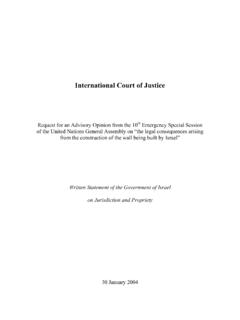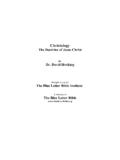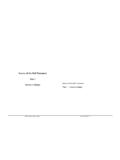Transcription of Jewish Medical Ethics - jewishvirtuallibrary.org
1 28 Jewish Medical EthicsAvraham Steinberg, Definition of the TermThe Hebrew term musar in the Bible refers to words of rebuke,teaching and warning1 or the act of punishment for conduct in life and includes basic principles concerning suchproper conduct, both between man and God, and between man and hisfellow section deals with general Jewish ethical principles and thosespecifically related to the practice of medicine. This subject isnowadays referred to as Jewish Medical General Ethical PrinciplesA fundamental difference exists between Judaism and secularphilosophical Ethics in many facets of life.
2 The basis, validity andsource of Jewish Ethics is rooted in the belief in God and His Torahwhereas the basis of secular Ethics is primarily humanism and Ethics and law are derived from the written and oral law(the Bible and the Talmud, respectively), which were divinely given toMoses on Mount Sinai. The Jewish rules of law and principles ofethics include commandments governing the relationship between manand God, some of which have no rational or humanistic explanation,are logical and explainable in humanistic Torah and its precepts are continually interpreted andexpanded by the rabbinic Sages of each generation who add protective.
3 1. Jeremiah 2:30; Zephaniah 3:2; Proverbs 12:1, 19:20 and Such as Proverbs 22 Explained in Yoma 67b where a distinction is made between mishpat which is a logicalappropriate and understandable law, and chok which has no rational basis but isRashi, Genesis 26:5, Leviticus 18:4 and19:19, end of chapter Medical Ethics29rules and regulations and provide legal, ethical and personal guidanceto the Jewish following are some basic principles of Jewish Ethics asviewed by Orthodox Judaism: In Judaism, there is no basic difference between laws andregulations and morals and Ethics because both are integralparts of the Torah and their validity flows from the power ofthe Torah and the Divine revelation.
4 Therefore, basicprinciples, discussions and debates on Jewish ethical issues donot differ from those of Jewish legal issues. This view iscontrary to the social and secular systems of law and Ethics . Jewish Ethics includes the guidelines for proper conduct for manTherefore, there is no difference in the binding nature of the lawbetween the laws prohibiting stealing, killing, falsehood,revenge, carrying a grudge and the like, and the laws prohibitingidol worship, Sabbath desecration, eating on Yom Kippur, andthe like. So, too, there is no difference between the obligationsof giving charity, visiting the sick, burying the dead, caring fororphans and widows and their like, and the observance ofdietary laws, eating unleavened bread (matzah) on Passover,sitting in the Sukkah on the holiday of Sukkot, and the like.
5 Thisview is contrary to the humanistic approach in which onlyrelations among human beings are dealt with. According to the Torah and Jewish law, one is obligated notonly to refrain from doing bad but one must do good by beingas it is written, turn from evil and do These are twoequal parts of the Jewish ethical obligation. Therefore, notonly are harmful acts such as stealing, wounding and killingprohibited but there exist positive commandments: to givecharity, to visit the sick, to be hospitable, to return lost objectsand the like.
6 This view is contrary to the legal approach whichis primarily concerned with the avoidance of harm to othersbut does not require doing good to others..4. Bertinoro, beginning of tractate Avot. 5. Psalms 34 Jewish Medical Ethics These Jewish principles require not only proper acts but alsoproper thoughts and intentions. The Torah forbids hatred,covetousness, revenge, carrying a grudge, and the like, anda stranger and the like, in spite of the obvious difficulties in One of the important Jewish ethical principles is to sanctifythe profane and to raise everyday human endeavor to a level Some ethical and religious systems praise those whowho practice asceticism in various ways.
7 This is not thenormative Jewish view. Judaism does not demand thedifficult task, that is the conquering and appropriateinclination does not mean to withdraw from the world but toovercome the inclination while living in the Thisrequirement is more difficult because it compels one toconduct oneself ethically during daily living which is full ofethical traps and Bible and Talmud are replete with references to properconduct, both between man and man, and between man and references and teachings are especially numerous in the booksof the early and late prophets, Ecclesiastics, Proverbs, Ethics of theFathers, tractates Derech Eretz Rabbah and Zuta, and the Aggadicportions of the Torah itself presents two types of teachings in regard toethical conduct: the precepts and laws including specific obligations.
8 The stories about the ethical conduct of the Patriarchs andMatriarchs which should be .6. See Rabbi Kook, , Part 1, pp. As articulated by the talmudic sages, Berachot The Book of Genesis only includes three of the 613 commandments but is full ofstories illustrating ethical characteristics of the Patriarchs and the Matriarchs. SeeGenesis Rabbah 60:11; Rashi, Genesis 24:42. See further , Medical Ethics31 According to the God should also be emulated by man, in the performance of what isgood and ethical teaching involves general concepts and principles onthe one hand, and specific rules and regulations on the importance of the principles of faith and Ethics is emphasizedby the talmudic Sages11 who state that 613 precepts werecommunicated to Moses at Mount Sinai; David came and reducedthem to eleven basic principles;12 when Micah came, he reduced themto three key virtues.
9 13 Isaiah further reduced them to two14 andHabakkuk condensed them to one overriding Bible cites a number of basic principles about the properrelationship between man and man, such as: Love your fellow man as yourself1617your neighbor, that is the whole Torah, while the rest is18 Do not profane the name of your God,19 namely do not conductyourself in a way that profanes the name of God20 You shall do what is righteous and good in the eyes of theLord21 Observe Justice and perform righteousness22 Despise evil and love good, and establish justice by the gate23.
10 9. Deuteronomy 28:9; Shabbat 133 Book of Commandments, positiveprecept #8, Maimonides, 1:1ff; Chinnuch , precept # Ramban, Deuteronomy 6:18, 12:28 and Leviticus 19:2. See also Magid Mishneh,Schechenim 14 Makkot According to Psalms According to Micah 6 According to Isaiah 56 According to Habakkuk 2 Leviticus 19 Jerushalmi Nedarim 9:4 6 Shabbat 31a. The view of Hillel. See further Ketubot 37b; Kiddushin 41a; Sanhedrin45a and 84b; Niddah Leviticus 18:21. See also Leviticus 19:12 and 22 Yoma 86a; Maimonides, negative precept #63 Yesodei Hatorah 5:1ff;Chinnuch, Precept # Deuteronomy 6:18.







